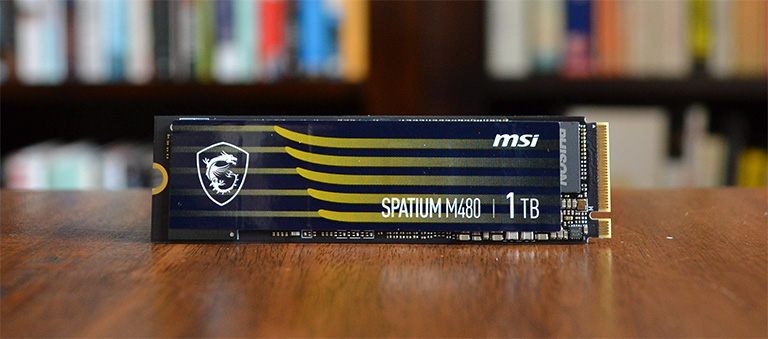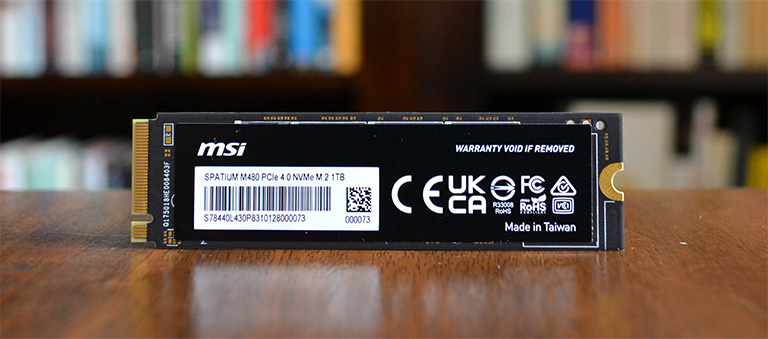Introduction
MSI is the latest big-name company to tip its hat into the solid-state storage (SSD) ring. Introduced to the enthusiast community a couple of months' ago, MSI is expanding its PC component proposition with the appropriately-named Spatium line of drives.
Latin for expanse, Spatium is released in M370, M470 and M480 models, along with a number of non-Spatium drives lower down in the pecking order. Focussing on the headline M480 for our review, MSI sent us a 1TB drive equipped with an optional heatspreader.
Specifications |
||||||
|---|---|---|---|---|---|---|
| Series | MSI Spatium M480 |
|||||
| Nominal Capacity | 500GB |
1000GB |
2000GB |
|||
| Controller | Phison PS5018-E18 |
|||||
| NAND | Micron 96-layer 3D TLC |
|||||
| Encryption | AES 256-bit |
|||||
| Interface | PCIe Gen 4 x4 |
|||||
| DRAM | SK hynix DDR4 |
|||||
| Sequential Read Speed | 6,500MB/s |
7,000MB/s |
7,000MB/s |
|||
| Sequential Write Speed | 2,850MB/s |
5,550MB/s |
6,800MB/s |
|||
| Random IOPs (4KB Reads) | 170K IOPS |
350K IOPS |
650K IOPS |
|||
| Random IOPs (4KB Writes) | 600K IOPS |
700K IOPS |
700K IOPS |
|||
| Average Maximum Power | 6.0W |
6.6W |
8.2W |
|||
| Sleep Power (PS4) | N/A |
|||||
| Available Form Factors | M.2 2280 |
|||||
| Endurance | 350TBW |
700TBW |
1,400TBW |
|||
| Life Expectancy | 1.6m hours |
|||||
| Warranty | 5 Years |
|||||
| Current Retail Price | £100 |
£165 |
£345 |
|||
MSI isn't reinventing the wheel here, and neither should it attempt to. Few companies have the necessary expertise to build modern NVMe PCIe M.2 SSDs from scratch. Spatium M480 uses a tried-and-trusted combination of the Phison PS5018-E18 controlled allied to 96-layer 3D TLC NAND from Micron.
It all sounds familiar as the likes of Corsair have already implemented it in performance models. Focussing on the vital specifications of the 1TB drive, it is no surprise the numbers are mostly in line with other 1TB-equipped E18 drives. As you will see later on, so is the firmware, which means performance ought to be predictable and consistent.
Spatium M480 is presented in the standard M.2 2280 form factor. Underneath the sticker - it has no thermal-wicking properties, unlike Sabrent solutions - resides the aforementioned controller, a 1GB hynix DDR4-2666 chip for buffering duties, and four NAND chips holding the requisite 1TB capacity.
You'll notice that speeds continue to escalate as capacity increases. This is to be expected through greater throughput parallelism. Most will zero-in on the 7GB/s sequential read and 5.5GB/s sequential write, but for those who push consumer SSDs to the limit, the 2TB model is clearly the better overall choice.
There's nothing on the back of note. Endurance is no longer a major concern for TLC-based drives, evidenced by the 700TBW cover over the five-year period. Breaking it down, that's around 384GB a day, every day, and intelligent wear-levelling algorithms spread the hurt across the NAND.
Pricing is also reasonably close to Corsair's MP600 Pro of the same capacity, so it's down to which brand you prefer.
Hoping to sweeten the deal, MSI sent us the heatsink version which retails for around £10 extra. The weighty heatsink makes a lot of sense if your motherboard can accommodate it - the bulky nature precludes use in some boards with tight-fitting covers.
MSI does well here as thermal pads are provided for both the top and bottom - we'd recommend first getting rid of MSI's stickers if going down this route - and clamps the Spatium M480 to the bottom retention plate by six screws, enabling a snug and secure fit.
One place where MSI doesn't do as well is with respect to software and support. There is no drive-cloning application included, while the usual monitoring utility is also conspicuous by its absence. No biggie in the grand scheme of things, but worth knowing nonetheless.
Right-o, on to the benchmarks.





